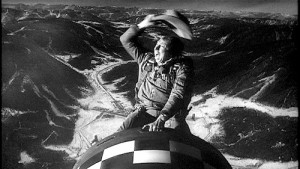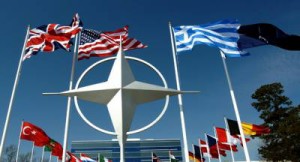
Originally appeared at Consortium News
Ex-NATO Commander Breedlove was so bellicose toward Russia that the Germans objected to his dangerous provocations, but he is now strutting his stuff in hopes of landing a job in a Clinton-45 administration, says Gilbert Doctorow.
At this conclusive stage of the presidential campaign cycle, Foreign Affairs magazine is doing what it traditionally does, showcasing on its pages candidates for appointive office in the cabinet of the next president whom the magazine’s editorial board would like to see installed.
Thus, the current, July-August issue carries an article by Philip M. Breedlove, until recently Commander of the U.S. European Command and NATO’s Supreme Allied Commander, Europe. His piece, entitled “NATO’s Next Act” might more honestly be called “Why I Have Earned My Next Job as Secretary of Defense in the Administration of Hillary Clinton.”
Image: Former NATO Commander Philip M. Breedlove.
During his service in Europe, General Breedlove was never bashful about being a politicking military officer who was keen to pick a fight with Russia. He met with the press often, making newsworthy pronouncements about Russia’s malevolent intentions and illegal actions that were unsupported by facts. Our European allies objected to Breedlove, stating openly that some of his allegations regarding Russian operations in Ukraine contradicted what their own intelligence services were reporting.
Indeed, on March 6, 2015, the Spiegel Online carried a story under a headline that says it all: “Breedlove’s Bellicosity: Berlin Alarmed by Aggressive NATO Stance on Ukraine.” At the time, it was believed that Breedlove was trying to sabotage the recently instituted cease-fire in Donbas and overturn the Minsk-2 Accords in favor of resumed fighting in which the U.S. would provide Kiev with lethal weapons. By this scenario, a full-blown proxy war with Russia would follow.
The purpose of the new essay in Foreign Affairs is, as I say, to spread the word on what Breedlove achieved in his three years on duty in Europe by turning NATO around and giving it a new/old calling. When he arrived, NATO was busy extricating itself from its failed campaigns out of region, in Afghanistan and Iraq, where it had faced unfamiliar challenges for which it was ill-equipped, fighting insurgencies and irregular troops.
On his watch, a new threat was seen emerging in Eastern Europe. In Breedlove’s words, this took the form of a revitalized and aggressive Russia, seeking to reclaim its great power status and sphere of influence in post-Soviet space.
With its takeover of Crimea in March 2014 and involvement in the Donbas on behalf of Russian-speaking forces rebelling against the new Maidan government in Kiev, Russia demonstrated both defiance of the American-controlled New World Order and breathtaking military prowess. It thereby became a threat worthy of NATO’s finest traditions as defender of “law and order” on the European home front.
Still more recent Russian action in Syria awakened Breedlove to the fact that Russia’s ambitions are global. In this context he now declares Russia, with its nuclear arsenal, to be an “existential threat” to the United States which must be met by superior force. After all, Breedlove tells us, force is all that the Kremlin understands.
After going through this pre-history, Breedlove explains exactly what we are doing now to strengthen NATO in Poland, the Baltic States and Romania/the Black Sea so as to be prepared to resist Russian aggression and deter its existential threat.
Upside-Down Narrative
Most everything is wrong with what Breedlove tells us in his article. It is a perfect illustration of the consequences of the monopoly control of our media and both Houses of Congress by the ideologists of the Neoconservative and Liberal Interventionist School. We see a stunning lack of rigor in argumentation in Breedlove’s article coming from absence of debate and his talking only to yes-men.
Image: Peter Sellers playing Dr. Strangelove as he struggles to control his right arm from making a Nazi salute.
Perhaps the biggest mistakes are conceptual: urging military means to resolve what are fundamentally political issues over the proper place of Russia in the European and global security architecture. Whereas for Clausewitz war was “a continuation of politics by other means,” for Breedlove politics – in this case, diplomacy – do not exist, only war.
In this respect, Breedlove is merely perpetuating the stone deafness of American politicians dating back to Dmitry Medvedev’s proposal in 2010 to negotiate an international convention bringing Russia in from the cold. The earnest offer of Russia’s most Westernizing head of state in a hundred years was left without response.
Breedlove’s entire recounting of what NATO is doing to stop a Russian threat to the Baltics and to Poland — through additional NATO boots on the ground and pre-positioned American heavy equipment fails — to mention, let alone explain what possible reason there might be for a Russian attack.
I contend that no realistic assessment of Russian national interest could justify their taking over the territories in question. The net result of any occupation could only be heavily negative due to hostile local populations even without considering its geopolitical consequences or retaliatory military and other action by the West.
Presumably the logic behind the assumption of Russian aggressive designs is illogic: the assumption of an insane Russian leadership. Such a line of thinking would be the direct fruit of the demonization of Vladimir Putin and of Russia more generally that the U.S. media has disseminated gleefully, with encouragement from the Obama administration.
Breedlove’s would-be boss in the Oval Office, Hillary Clinton, has likened the Russian ruler to Hitler. That obviates the need to examine rational calculations of your adversary.
Then there is Breedlove’s totally wrong-headed conceptualization of what constitutes the world order that he says is under threat. In his understanding, the United State is, by definition, the sole supplier of public good to the world and everything that it initiates is selfless and right.
This self-righteousness begins with history, with the sequencing of who did what to whom, who honored and who violated international obligations, who is the aggressor and who is the victim. But this all comes down to one question: when did history start.
In Breedlove’s reading of history, the narrative that counts and is relevant to where we are today all started with the Russian “invasion” of Crimea. The controversial overthrow of the legitimately elected President of Ukraine on Feb. 22, 2014, the day after France and Germany brokered an agreement between the government and opposition (for reduced presidential powers and early elections) does not exist in Breedlove’s version of history. Nor, of course, does any other prior Western intervention in the intra-Ukrainian power struggle going back to the start of the Maidan demonstrations in December 2013.
This leaves us with the whole series of Russian reactions that he gives us without any reference to the missing actions by the U.S.-led West. There are other holes in Breedlove’s logic through which you could drive a tank, if I may use metaphors from his domain of expertise.
Reassessing Russian Might
It is in a way refreshing to see Breedlove recognize (within limits) the newfound capabilities of the Russian military, which just several years ago were mocked by Western commentators, even by the occupant of the Oval Office.
Image: A scene from “Dr. Strangelove,” in which the bomber pilot (played by actor Slim Pickens) rides a nuclear bomb to its target in the Soviet Union.
Breedlove does underestimate the skills and equipment of the Russian air force and insists on the underlying military superiority of the U.S. and its NATO allies in the European theater. But, on balance, he asserts that today Russia poses an existential military threat to the United States. It would be nice if he finished the thought and explained exactly how and why (since Russia is not the only country with nuclear weapons and the ability to deliver them but like those other countries – China, for instance – has no rational reason to do so unless directly threatened).
In any case, what is the appropriate response to an existential threat? Do you recommend the continued rapid build-up of NATO forces precisely at Russia’s Baltic and Black Sea borders to counter a perceived (though nonexistent) localized threat or do you address the existential threat by seeking to minimize tensions?
To date, and into the next five years, all of the U.S. and NATO measures which Breedlove describes and for which he takes credit have only unnerved the Russians and caused them to respond with equally provocative and dangerous counter-measures of a localized nature without in any way compromising their nuclear capability to wipe the United States off the map in any hot war.
Does this baiting the Russians near their borders make any sense? This was precisely the point that German Minister of Foreign Affairs Frank Walter Steinmeier has just called out in an interview published in Bild am Sonntag in which he speaks against any further saber-rattling by NATO in Poland or the Baltic States.
The seeming parallels between stepping up to the line today, and stepping up to the line in Berlin during the Cold War are illusory. The present line is not in a distant buffer zone which Joseph Stalin had created precisely for this purpose, to remove conflict from Russia’s borders.
It is so threatening to Russia’s survival that the Kremlin is now moving vast military resources from Central Russia into the Leningrad Oblast, within a very few miles of the new NATO presence just across the border in the Baltics. The time for either side to react to local military incidents has been shortened immensely compared to the past. This is a formula for Doomsday which Breedlove willfully ignores.
The $3.4 billion expenditure, which President Obama has allocated to bring forward depots of American heavy equipment and key personnel to Poland, Romania and the Baltic States, recognizes the logistical disadvantage of NATO forces under the remote defense perimeter that extends to Russia’s western and southern frontiers. But it cannot resolve this intractable disadvantage.
Territorial Disadvantage
It has been argued that a major factor that worked against Russian forces in World War I was logistical – the length of time it took Russia to move its men and equipment from the centers of population of the country hundreds if not thousands of kilometers away to its western borders where the fight against Germany was going on.
Image: NATO headquarters in Brussels, Belgium.
Today, the U.S. and NATO have placed themselves in exactly the same disadvantage by seeking to fight Russia in a conventional war right where the Russians are concentrating the bulk of their strength and where NATO can at best only position “trip wire” forces having symbolic, not actual military defensive value.
The best that NATO can propose, it would seem, is to snatch the Russian enclave of Kaliningrad (the clear mission of the Anakonda-16 games now going on in Poland) in case the Russians occupied the Baltic States (within the 60 hours or so that a recent Rand Institute study suggests is feasible).
However, as President Putin has stated clearly, such encroachment on Russian soil will unleash a nuclear response from Russia that will include missile attacks on the mainland USA, i.e. not limited to the European theater.
Finally, let’s consider another absurdity in General Breedlove’s letter setting out his candidacy for a cabinet position. He repeats, parrot-like, the position of the Obama administration and of putative Democratic candidate for President Hillary Clinton that we can selectively cooperate with Russia on issues of common interest like counter-terrorism, Pacific fishing rights (!) and the like even as we remain engaged in a life-or-death scramble for position on the ground in Europe.
In fact, the U.S. effort to totally isolate Russia by cutting off many, perhaps most of its bilateral programs of cooperation with the country have worked precisely to defeat cooperation, none more grievously so than in the area of fighting terrorism.
Meanwhile, what amounts to American encouragement of the Islamic State and Al Qaeda’s Nusra Front in Syria by pressing for the overthrow of the Russian-backed regime of Bashar al-Assad continues to this day under the guise of protecting the “moderate opposition” that happens to be embedded among the jihadist ‘’bad guys.’’
The fairy tales coming from Washington should not fool anyone, but Breedlove passes them along to his readers in the smug expectation that they will accept whatever he utters.
By lending its valuable “real estate” to the campaign for a high-level appointment by one of the most outspoken Cold Warriors within the U.S. military, the editorial board of Foreign Affairs magazine has shown yet again that it is incapable of guarding its own neutrality or balance.
Gilbert Doctorow is the European Coordinator of The American Committee for East West Accord Ltd. His most recent book, Does Russia Have a Future? was published in August 2015. © Gilbert Doctorow, 2016









